 Cross-posted from the Chronicle of Higher Education.
Cross-posted from the Chronicle of Higher Education.
In a time when we’ve seen global economic crisis, societal unrest, and ecological deterioration, the National Endowment for the Humanities (NEH) could not have picked a more potent speaker than Wendell Berry for this year’s Jefferson Lecture in the Humanities. In his remarks in Washington, D.C., on Monday, the essayist, novelist, and poet — a Kentuckian long known for his advocacy for family farming, community relationships, and sustainability — delivered a characteristically eloquent yet scathing critique of the industrial economy and its toll on humanity.
“The two great aims of industrialism — replacement of people by technology and concentration of wealth into the hands of a small plutocracy — seem close to fulfillment,” Berry told the crowd at the John F. Kennedy Center for the Performing Arts. “At the same time, the failures of industrialism have become too great and too dangerous to deny. Corporate industrialism itself has exposed the falsehood that it ever was inevitable or that it ever has given precedence to the common good.”
The Jefferson Lecture “is the most prestigious honor the federal government bestows for distinguished intellectual achievement in the humanities,” according to the NEH, which sponsors it every year.
Before the speech, Berry wryly commended the NEH’s courage in inviting him without first reading his remarks. At the end of the event, NEH Chair Jim Leach humorously added: “The views of the speaker do not necessarily reflect the views of the United States government.”
Berry’s reputation and strident prose must have promised fireworks: An official with the NEH said that Berry’s lecture was sold out three days after it was announced (although some seats were unclaimed on a cold, rainy night in Washington). Samuel Alito, the conservative Supreme Court justice, was rumored to be there.
Berry’s speech was a discussion of affection and its power to bind people to community. It was also a meditation on place and those who “stick” to it — as caretakers and curators. “In affection we find the possibility of a neighborly, kind, and conserving economy,” Berry said.
The opposite of the “sticker” — in the words of Berry’s mentor, the writer Wallace Stegner — is the “boomer,” whose approach is to “pillage and run.”
Berry described James B. Duke, the founder of the American Tobacco Company, as a boomer who had an impact on the author’s own farming family history: In 1907, Berry’s grandfather sought to sell his tobacco crop in Louisville, so the family could maintain a meager existence on their land in Kentucky. But thanks to prices driven down by the monopolistic American Tobacco Company, his grandfather came home without a dime.
Berry once encountered James B. Duke — in bronze, if not in the flesh — during a visit to Duke University. “On one side of his pedestal is the legend: INDUSTRIALIST. On the other side is another single word: PHILANTHROPIST. The man, thus commemorated, seemed to me terrifyingly ignorant, even terrifyingly innocent, of the connection between his industry and his philanthropy.”
That disconnect is endemic to our era. “That we live now in an economy that is not sustainable is not the fault only of a few mongers of power and heavy equipment. We all are implicated,” Berry said. “By economic proxies thoughtlessly given, by thoughtless consumption of goods ignorantly purchased, now we all are boomers.”
The antidote, Berry said, is affection, connection, and a broader definition of education — to study and appreciate practical skills like the arts of “land use, life support, healing, housekeeping, homemaking.”
Berry said that we should appreciate the word “economy” for its original meaning of “household management.”
“So I am nominating economy for an equal standing among the arts and humanities,” Berry said. “I mean, not economics, but economy — the making of the human household upon the earth: the arts of adapting kindly the many human households to the earth’s many ecosystems and human neighborhoods.
“This is the economy that the most public and influential economists never talk about, the economy that is the primary vocation and responsibility of every one of us.”



